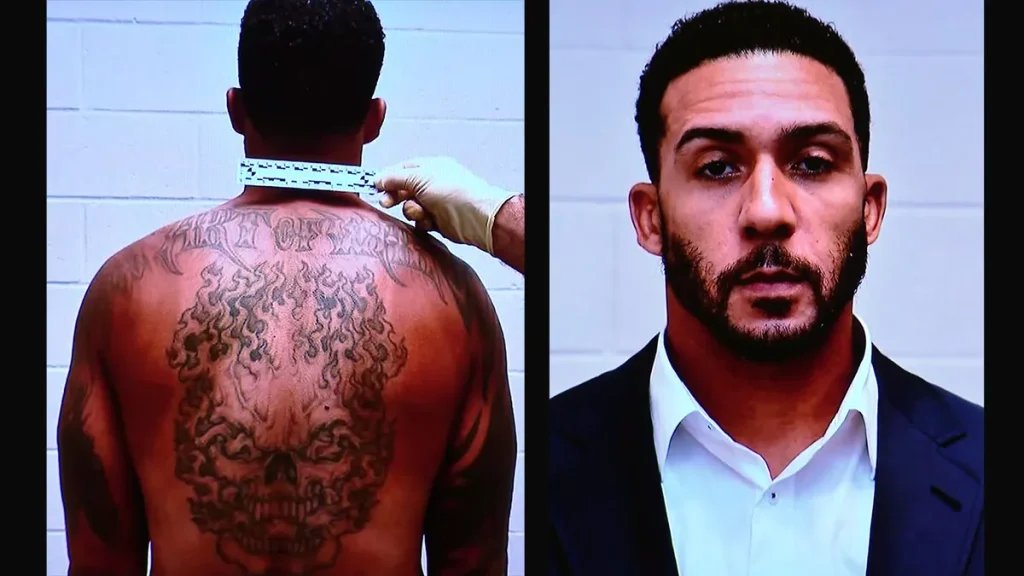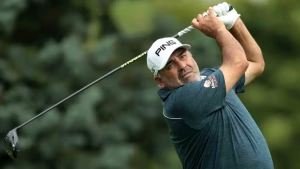Kellen Winslow II: Celebrity Convict #13.
Crimes: Rape and two counts of assault
Sentence: 14 Years
Who is Kellen Winslow II ?
Kellen Boswell Winslow II, born on July 21, 1983, in San Diego, California, is a former American football tight end. The son of Hall of Famer Kellen Winslow Sr., who played for the San Diego Chargers, Winslow followed in his father's footsteps, becoming a standout football player in his own right. He attended Scripps Ranch High School in San Diego, where he showcased his athletic prowess before going on to the University of Miami.
At Miami, Winslow quickly became a key player for the Hurricanes. As a freshman in 2001, he was part of the national championship-winning team, and by his sophomore year, he had become a dominant force at tight end. Winslow finished the 2003 season with 57 receptions for 726 yards and eight touchdowns, earning unanimous All-American honours and the John Mackey Award as the top tight end in college football. He declared for the 2004 NFL Draft after his junior season, foregoing his senior year at Miami.
The Cleveland Browns selected Winslow as the sixth overall pick in the 2004 NFL Draft, marking him as the highest-drafted tight end in over three decades. His early career was marred by injuries, starting with a broken leg in his rookie season, followed by a severe knee injury in a motorcycle accident. Despite these setbacks, Winslow bounced back in 2006 and had a Pro Bowl-calibre season in 2007, recording 82 receptions for 1,106 yards.
Winslow played for the Cleveland Browns until 2008 before being traded to the Tampa Bay Buccaneers in 2009, where he had a record-breaking season. He continued his career with the Buccaneers, New England Patriots, and New York Jets before retiring after the 2013 season.

In 2019, Winslow was convicted on charges of rape and sexual battery, a significant turn in his post-football life. Despite these legal issues, Winslow’s football career remains marked by moments of brilliance on the field.
Legal Problems and Arrest
Kellen Winslow II, a former NFL player, was arrested multiple times between 2018 and 2019, leading to a series of serious criminal charges. On June 7, 2018, Winslow was taken into custody after fleeing a mobile home park in Encinitas, California. He was charged with felony first-degree burglary and held on a $50,000 bond. Just one week later, on June 14, 2018, Winslow faced further charges, this time for kidnapping and rape. These charges were in relation to two separate incidents involving different women, which would later form the basis of a highly publicized legal case.
In addition to the aforementioned charges, Winslow was accused of raping an unconscious 17-year-old girl in 2003, when he was 19. Following his arrests, Winslow was placed on house arrest with a GPS monitor after posting $2 million bail. By July 2018, Winslow was ordered to stand trial for these charges. However, as the case developed, additional charges emerged, including the rape of an unconscious woman, which further added to the legal complexity of his situation.
In March 2019, Winslow’s legal troubles intensified as his bail was revoked due to new allegations of misdemeanour offences, including lewd conduct and battery of an elderly person. This marked a pivotal moment in Winslow’s criminal proceedings and began a prolonged period of legal scrutiny. His repeated arrests would set the stage for what would become a lengthy and contentious trial.
Convictions and Prison
Following a series of arrests and trials, Kellen Winslow II ultimately entered into a plea agreement in November 2019. In exchange for his guilty plea to charges of the rape of an unconscious teenager and sexual battery on a 54-year-old hitchhiker, the court agreed to sentence Winslow to between 12 and 18 years in prison. This sentence, which was significantly lower than the potential life sentence he faced if convicted at trial, came with the stipulation that Winslow would be placed on lifetime parole upon his release. As part of the plea deal, he waived his right to appeal any convictions or verdicts.
The defence team for Winslow argued that his actions could be linked to brain trauma sustained during his football career, with references made to potential chronic traumatic encephalopathy (CTE). While CTE was not accepted as a legal defence, a clinical psychologist testified to symptoms that could suggest brain injury, which influenced the sentencing decision.
Winslow’s sentencing, originally scheduled for March 2020, was delayed due to the COVID-19 pandemic. However, in February 2021, Winslow accepted a 14-year prison sentence as part of a revised agreement, with the court formally sentencing him on March 3, 2021. During sentencing, Judge Blaine Bowman remarked on Winslow’s brazen conduct and described him as a sexual predator who targeted vulnerable victims. Winslow's sentence was the maximum allowable under the plea deal.
As of October 2023, Winslow is incarcerated at the California Correctional Institution in Tehachapi, where he continues to serve his sentence.
Winslow's defence team contended that their client had likely endured over 1,000 head impacts throughout his football career, which they believed contributed to his diagnosis of frontal lobe damage and symptoms consistent with chronic traumatic encephalopathy (CTE). Winslow's father, Winslow Sr., addressed the court, describing his son as a "good man with a huge heart" who was struggling with depression. He further argued that Winslow required rehabilitation rather than punishment, emphasising the need for treatment over incarceration.
Kellen Winslow II's Effort to Reduce 14-Year Prison Sentence Denied Again
On January 2, 2025, The California Court of Appeal ruled that Winslow’s habeas corpus petition, which sought a reduction in his sentence, was procedurally barred. The court noted that Winslow could have raised the same claims during his direct appeal years earlier, but failed to do so.
In 2021, Winslow, 41, was sentenced to 14 years in prison after pleading guilty to multiple sex crimes against five women, including the rape of an unconscious woman in 2003 and a homeless woman in 2018. The former NFL first-round draft pick entered into a plea agreement, accepting the sentence, but later sought resentencing under California's criminal justice reform laws that came into effect after his sentencing.
His petition relied on AB 124, a state law designed to help individuals who have experienced “psychological, physical, or childhood trauma.” The law mandates that courts impose a lower term of sentencing for those who have suffered such trauma, unless there are aggravating circumstances. Winslow’s attorney cited his past brain injuries from football, as well as childhood sexual abuse, as factors that should be considered. A clinical psychologist had previously diagnosed Winslow with symptoms of chronic traumatic encephalopathy (CTE), a degenerative brain condition linked to repeated head trauma.
In his filing, Winslow requested a two-year reduction in his sentence, arguing that the effects of his brain injuries and childhood trauma contributed to his decision-making during the commission of the crimes. His attorney, Patrick Morgan Ford, emphasized that Winslow was not seeking to avoid punishment but simply wanted a hearing to assess the impact of his brain injuries on his behaviour.
Despite the setback, Ford stated that Winslow was disappointed but understood the legal complexities of the process. He also expressed Winslow’s belief that the issue of CTE and its effects on former NFL players should be addressed more thoroughly.
Winslow had previously filed an appeal in 2021 seeking additional credit for time spent on electronic monitoring. However, the California Court of Appeal dismissed that appeal as well, asserting that Winslow should have raised the new claims in 2021 when the law changed. The court also noted that granting a reduction in Winslow’s sentence could ultimately lead to his plea agreement being vacated, which might result in a more severe sentence.
Winslow, who is currently serving his sentence at the California Rehabilitation Center in Norco, is not eligible for parole until September 2028. He has made attempts to improve himself during his time in prison, committing to therapy, studying the Bible, and serving as a role model for other inmates. His new attorney, Ford, noted in court filings that Winslow has shown remorse for his actions and is dedicated to self-improvement.
This latest legal setback follows a previous denial in 2023 by a San Diego County judge for a similar request. Winslow's legal team is considering further action, with plans to present the case to the California Supreme Court in the near future.
Winslow's Previous Appeal
In 2021, Kellen Winslow filed an appeal seeking 233 days of custody credit for the time he had spent on electronic monitoring. However, the appeal was pending when new state laws were introduced, which Winslow's attorney did not raise at that time. The California Court of Appeal ruled that these issues should have been brought up during the original appeal and rejected the argument from Winslow's current attorney that the failure to do so was due to ineffective counsel in 2021-2022.
The court noted that even if the claim of ineffective assistance of counsel was considered, Winslow did not provide any declaration from his previous lawyer to explain why these issues were not raised in the direct appeal.
Furthermore, the appeals court suggested there was a plausible reason why Winslow's previous appellate counsel may have chosen not to raise the claims in question. They pointed out that applying the new legal changes to Winslow's case could potentially void his plea agreement, possibly resulting in a longer prison sentence than the 14-year term he currently serves.
Personal Life
Kellen Winslow II married Janelle Winslow on June 15, 2006. Together, they had two children: a son, Jalen, born in February 2011, and a daughter, Juliana, born in August 2013. However, their relationship ended in August 2019 when Janelle filed for divorce, citing irreconcilable differences.
In addition to his immediate family, Kellen was deeply affected by the death of his half-brother, Justin Winslow, on October 17, 2006. Justin, who was 23 years old, was found unconscious by their mother, though the cause of his death was never disclosed. Kellen and Justin were the only sons of Kellen Winslow, Sr., a Hall of Fame tight end for the San Diego Chargers.
The loss of his half-brother, combined with other personal struggles, has been a significant part of Kellen Winslow II’s life narrative, influencing various aspects of his personal and professional journey. His family life has been marked by both the joys of raising children and the pain of personal loss, alongside the challenges brought on by his legal troubles.
Comeback Attempt
In 2016, after more than two years away from the NFL, Winslow made an attempt to return to professional football. He had a workout with the Green Bay Packers in August, but ultimately, no contract was offered to him.
In 2017 and 2018, Winslow participated in The Spring League, a professional developmental league aimed at providing former NFL players with an opportunity to showcase their skills for potential teams.
Career Stats:
| Year |
Team |
Games Played (GP) |
Games Started (GS) |
Receptions (Rec) |
Yards (Yds) |
Yards Per Reception (Avg) |
Longest Reception (Lng) |
Touchdowns (TD) |
Fumbles (Fum) |
Fumbles Lost (Lost) |
| 2004 |
CLE |
2 |
2 |
5 |
50 |
10.0 |
21 |
0 |
0 |
0 |
| 2005 |
CLE |
0 |
0 |
did not play due to injury |
|
|
|
|
|
|
| 2006 |
CLE |
16 |
16 |
89 |
875 |
9.8 |
40 |
3 |
1 |
0 |
| 2007 |
CLE |
16 |
14 |
82 |
1,106 |
13.5 |
49 |
5 |
2 |
1 |
| 2008 |
CLE |
10 |
8 |
43 |
428 |
10.0 |
30 |
3 |
1 |
1 |
| 2009 |
TB |
16 |
14 |
77 |
884 |
11.5 |
42T |
5 |
0 |
0 |
| 2010 |
TB |
16 |
11 |
66 |
730 |
11.1 |
41T |
5 |
1 |
0 |
| 2011 |
TB |
16 |
15 |
75 |
763 |
10.2 |
37 |
2 |
2 |
1 |
| 2012 |
NE |
1 |
0 |
1 |
12 |
12.0 |
12 |
0 |
0 |
0 |
| 2013 |
NYJ |
12 |
3 |
31 |
388 |
12.5 |
34 |
2 |
0 |
0 |
| Career |
|
105 |
83 |
469 |
5,236 |
11.2 |
49 |
25 |
7 |
3 |





















